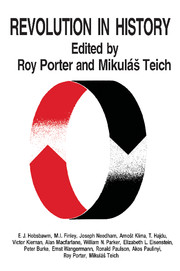Book contents
- Frontmatter
- Contents
- Notes on contributors
- Introduction
- 1 Revolution
- 2 Revolution in antiquity
- 3 Social devolution and revolution: Ta Thung and Thai Phing
- 4 The bourgeois revolution of 1848–9 in Central Europe
- 5 Socialist revolution in Central Europe, 1917–21
- 6 Imperialism and revolution
- 7 Socio-economic revolution in England and the origin of the modern world
- 8 Agrarian and industrial revolutions
- 9 On revolution and the printed word
- 10 Revolution in popular culture
- 11 Revolution in music – music in revolution
- 12 Revolution and the visual arts
- 13 Revolution and technology
- 14 The scientific revolution: a spoke in the wheel?
- 15 The scientific-technical revolution: an historical event in the twentieth century
- Index
13 - Revolution and technology
Published online by Cambridge University Press: 05 February 2015
- Frontmatter
- Contents
- Notes on contributors
- Introduction
- 1 Revolution
- 2 Revolution in antiquity
- 3 Social devolution and revolution: Ta Thung and Thai Phing
- 4 The bourgeois revolution of 1848–9 in Central Europe
- 5 Socialist revolution in Central Europe, 1917–21
- 6 Imperialism and revolution
- 7 Socio-economic revolution in England and the origin of the modern world
- 8 Agrarian and industrial revolutions
- 9 On revolution and the printed word
- 10 Revolution in popular culture
- 11 Revolution in music – music in revolution
- 12 Revolution and the visual arts
- 13 Revolution and technology
- 14 The scientific revolution: a spoke in the wheel?
- 15 The scientific-technical revolution: an historical event in the twentieth century
- Index
Summary
The subject proposed by the editors was tempting. After an initial glance through the varied literature on the history of technology and culture, as well as on the philosophy of technology, I was, like W. Jonas, ‘overwhelmed and bewildered by the wealth of technical revolutions’, but was simultaneously struck by the fact that numerous authors fundamentally rejected the idea of describing technological changes as revolutionary. There were two factors which changed my mind about making the ‘revolutions’ of the stirrup, fulling mill, clockwork, water wheel, steam engine and electricity – to name but a few – the focal point of my study. On the one hand, there was the limited space available. On the other hand, and more decisively, there were two perceptions gleaned from my reading. Firstly, in the majority of cases, ‘revolution’ is used only as a word – not as a scientific term. This means, in my opinion, that the central question, whether these ‘revolutions’ changed technology as a system, is not even put, let alone answered. Secondly, many authors deny the revolutionary character of just those technological innovations which are treated by historical handbooks in varying depth and order under the heading ‘The Industrial Revolution’.
The last perception bewildered me all the more because in no book on the history or philosophy of technology is it doubted that the technological changes which took place approximately between 1760 and 1860 introduced a new era. Therefore, I have made it my primary objective to show that these changes in manufacturing techniques – which through their quality and quantity resulted in the breakthrough from ‘manufacture to machino-facture’ do indeed constitute a technical revolution. A revolution, for the reason that these changes, the" base element of which was the massive and irreversible application of machines for the forming of materials, led to the establishment of a new technological system that has been developed continuously since then and still exists.
- Type
- Chapter
- Information
- Revolution in History , pp. 261 - 289Publisher: Cambridge University PressPrint publication year: 1986
- 8
- Cited by

